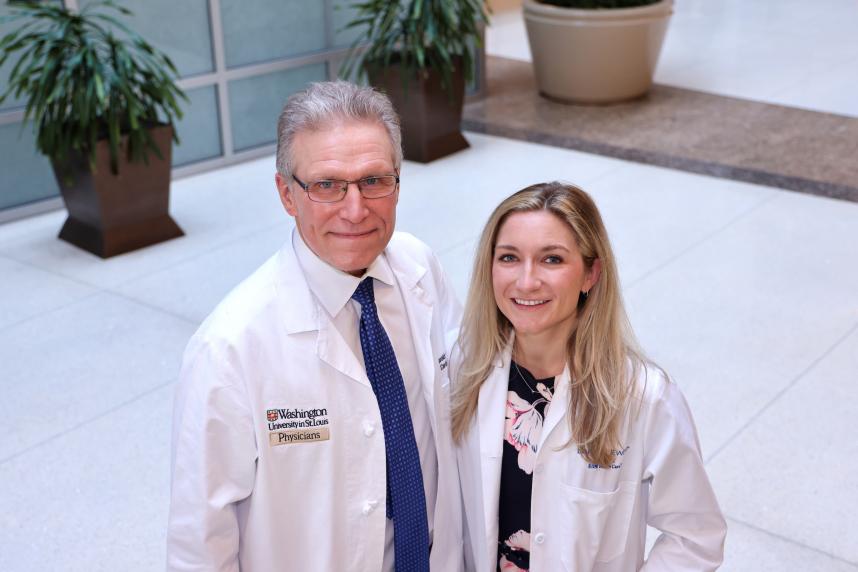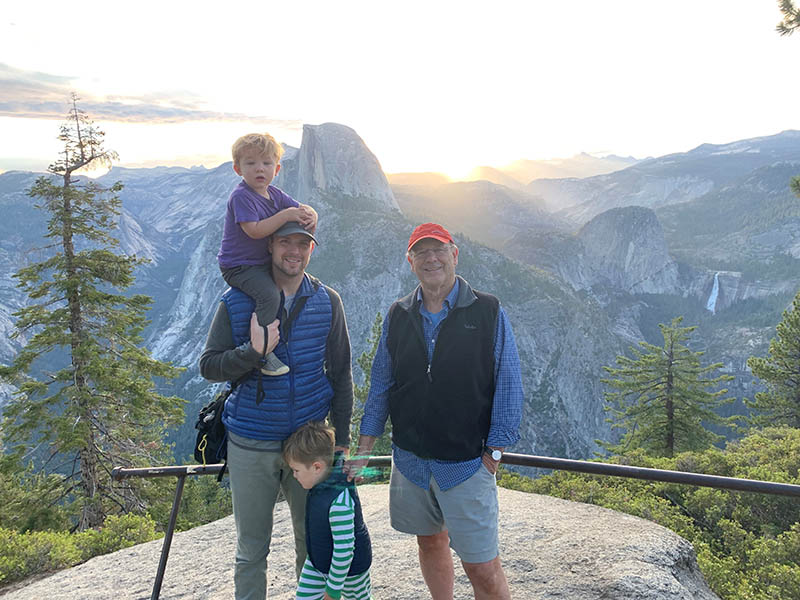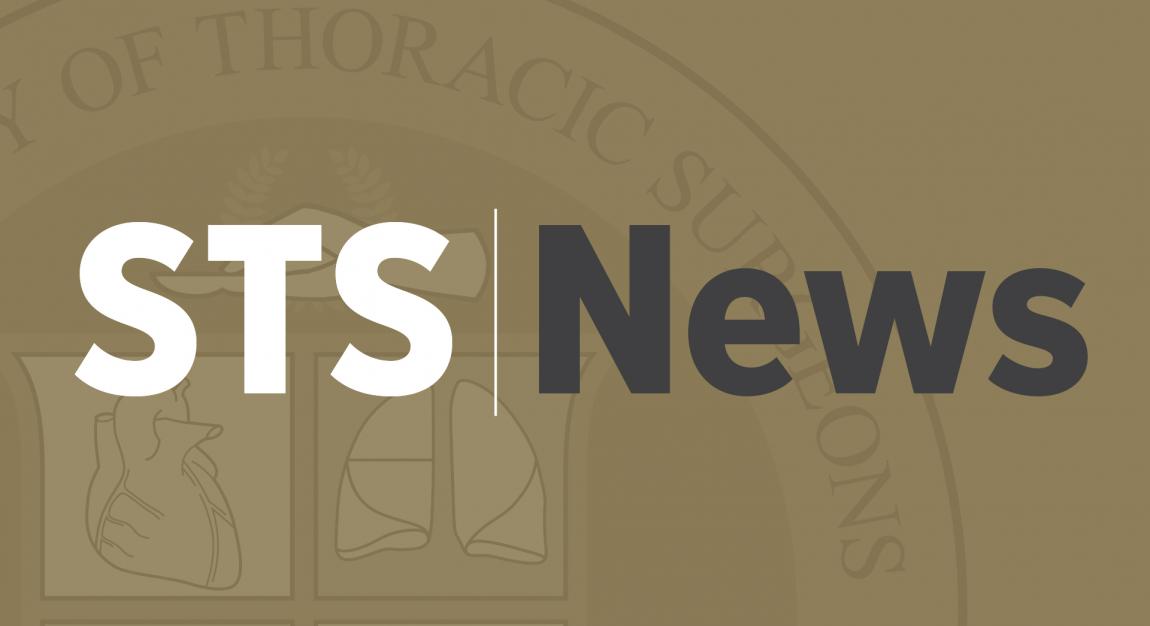Whether they know from the start that they’ll emulate their parents’ careers—or they fight tooth-and-nail to carve a different path—there seems to be something in the genes of cardiothoracic surgeons that pulls their children toward their calling.

Hal and Sophia Roberts
For Harold “Hal” G. Roberts Jr., MD, and Sophia H. Roberts, MD, Barnes Jewish Hospital and Washington University in St. Louis, Missouri, is a cornerstone, an alma mater, and a workplace.
Last year, Dr. Hal Roberts joined the Barnes Jewish Heart and Vascular Center, transitioning from a South Florida private practice. He arrived a celebrated member of the surgical team, with more than 20 years of surgeries under his belt, a patent for a 3D mitral annuloplasty ring, the first publication to describe a modification of the Cox Maze IV right atrial lesion set, and a reputation for performing the first TAVR procedure in Broward County, Florida. And another singular distinction: Sophia’s dad.
“On ‘Take Your Child to Work Day,’ cardiothoracic surgeons can pretty much blow it out of the water by bringing their kid to the OR,” Sophia reflected. “Seeing the team dynamic and the real leadership that comes with being the attending surgeon had a lasting impact on me.”
Dr. Sophia Roberts adds that although her siblings didn’t go into medicine, they also considered the experience to be special—and fundamental to understanding their dad as a person.
“I tend to be a bit quieter than baseline,” she explained, “and that initially made me concerned for my ability to lead an operative team.” But observing her father, in addition to other attending surgeons and their diverse personalities, helped to assuage that concern.
“I imagine that my leadership style will channel components of my dad and my other mentors,” Sophia said. “Particularly those who lead without being the loudest person in the room.”
Dr. Sophia Roberts is a third-year resident at Washington University, and she’ll soon be assuming a senior resident role. Before Dr. Hal Roberts accepted the job, he made sure that he had Sophia’s blessing, because they’d be working in the same program.
Sophia has explored many facets of surgery during her training, but her father says that, just as he did, she found that she enjoyed caring for cardiac surgical patients the most.
“As far as Sophia deciding to go into cardiothoracic surgery, I was very flattered, but I made quite sure that she realized what she was getting into,” Dr. Hal Roberts said.
“Cardiac surgery can be a physically and emotionally draining field, but it does give me great satisfaction in knowing that the quality and quantity of my patients’ lives are favorably impacted by the care I render.”
The new position at Barnes Jewish has afforded the elder Dr. Roberts the opportunity to teach—a realm he entered relatively late in his career. He calls it his greatest satisfaction, saying, “I have been amazed at how much fun this really is.”
For her academic development, Sophia is working through a fellowship in cardiovascular device innovation. “Delving into engineering is new terrain for me, and I am excited to carry our new devices from concept to pre-clinical testing,” she said, adding, “It’s pretty surreal to have a single dream for so long and then realize you’re living it.”
Dr. Hal Roberts hopes that his daughter will have exposure to classic as well as novel surgical approaches. “Though there will be more and more minimally invasive techniques on the horizon, I always think there will be a role for some of the basic procedures, like coronary artery revascularization, that we have been effectively doing for years.”

David and John Cleveland
“We’re both extremely pragmatic, to both benefit and fault at times,” says John Cleveland, MD, of himself and his father, David C. Cleveland, MD, MBA.
The elder Dr. Cleveland is an associate professor of surgery at the Heersink School of Medicine, part of the University of Alabama at Birmingham. He’s a giant in congenital heart surgery, having served as chief of pediatric cardiac surgery for the Children’s Hospital in Buffalo, New York, the Children’s Hospital at Medical City Dallas in Texas, and St. Joseph’s Hospital and Medical Center in Phoenix, Arizona. At St. Joseph’s, he founded the Eller Congenital Heart Center and served as its executive director.
As a kid, John Cleveland was acutely aware of the demands of his father’s profession, which often pulled the elder Dr. Cleveland away from time with his wife and three children. He missed some of his kids’ big milestones, from music recitals to winning touchdowns, because he was working to save the lives of “other people’s kids.”
Even so, John was drawn to a surgical career himself—but he was determined to find a course that wouldn’t cause him to miss out on moments with his own budding family. He leaned toward reconstructive plastic surgery.
John’s internship years brought an encounter that for most would be incandescent: He helped treat a man who had been mauled by a grizzly bear. But while his fellow trainees were thrilled at the opportunity to perform a potentially once-in-a-career reconstruction, John realized that he didn’t feel the same rush.
Plastic surgery wasn’t for him, he now understood—and he was just weeks away from starting a plastic surgery residency. Luckily, he was able to slide into a surgical rotation in a different specialty.
“In the operating room, a veteran doctor threw question after question at the rookie,” recounted a feature by the American Heart Association. “Even as the queries became more complex, John—who’d never studied this area, much less trained in it—aced the quiz. The look on the veteran doctor’s face sent John a clear message.”
The area was cardiac surgery. Specifically, pediatric cardiac surgery. And John was a natural.
Since those days, Drs. John and David have developed a deeper understanding of one another—and of how they both lamented the moments they missed.
“I have been surprised by the manner in which my career has allowed me to see my father from a different perspective,” John reflected. “Now that I am a dad myself, working in the same field, I have come to better terms with the demands that this job places on you and how much it can compete with family life. It has certainly increased my empathy and understanding of how my dad had to do things growing up.”
It has also helped John approach his career decisions with a savviness for work/life balance that wasn’t as feasible for his dad.
Dr. David Cleveland was often a lone ship in his profession, having at most one surgical partner to cover for him in an emergency. Dr. John Cleveland landed a fellowship at Children’s Hospital Los Angeles (CHLA) in California, which has a large surgical staff that he described as virtually interchangeable because of their top-notch skillsets.
“I am entering my fourth year as an attending and have taken over as the program director for our congenital heart surgery training program,” Dr. John Cleveland said. “I’m looking forward to continue matching high-quality applicants that our group of surgeons can mold into excellent technicians as well as thoughtful bedside physicians who care for children with congenital heart disease.”
As his career and family have blossomed, John has happily stayed with CHLA, and it allows him the freedom to be present for moments like birthdays and softball games.
The senior Dr. Cleveland recently celebrated a milestone of his own. He has retired from clinical practice, and he’ll now have the time to not only make memories with his kids and grandkids but also to pick up a research project for which he completed pilot data before the pandemic. He and John are working collaboratively.
“We are transplanting genetically modified pig hearts into infant baboons with the intention to translate this to clinical care of neonates and infants as a bridge to cardiac allotransplant,” Dr. John Cleveland said. “The current technology used to bridge this fragile patient population is fraught with complications and risk. We believe xenotransplant will prove to be safer and a more appropriately tailored option for these small children.”
The research is funded, Dr. Cleveland said, and it’s slated to kick off this month.
If you know of a unique member experience that should be featured in STS News, contact stsnews@sts.org.
